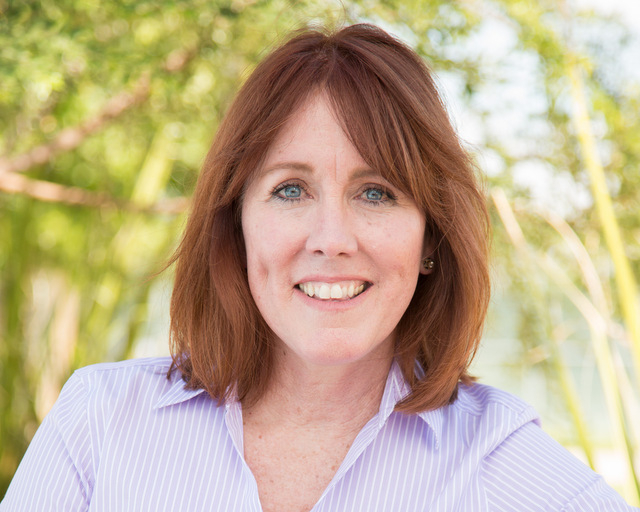Tenacious prosecutor makes case for herself

Author’s note: This post has been altered from its original version to correct an error.
If nothing else, you have to give Teresa Lowry credit for optimism.
Like many first-time candidates for office, she envisions the possibility that things can change, if only the right people with the right motives get elected to the right offices. Like an episode of the Aaron Sorkin series The West Wing, things won’t be easy but they will always end well.
“If I’m there, something will get done,” says Lowry, a veteran Clark County prosecutor who is challenging Senate Minority Leader Michael Roberson, R-Henderson. “I’m not asking you to take my word for it,” she adds. “I think that the key is building consensus and getting results.”
To veterans of the process, comments like that sound terribly naive. Every person who has ever alighted in Carson City has had the feeling that they’re going to witness statesmanship, struggle and progress on big issues. Most leave having seen a slow-moving, incremental process blocked by partisanship, lobbying and special interest influence.
But Lowry, a Democrat, isn’t buying it for a second. “I am extremely tenacious,” she said. “I see this an extension of my public service.”
That public service began — if you don’t count her childhood job delivering the Review-Journal — with a job as a child abuse investigator for the state. Later, after graduating from law school, Lowry returned to Clark County and began working for the district attorney’s office. Eventually, she prosecuted child abuse cases for the special victims unit, until she was promoted to head up the family support division.
There, Lowry found things in disarray: The state was 54th in the nation (behind places such as Puerto Rico and Guam) in child support collections. But Lowry boned up on management techniques and best business practices and led the 300 employees of the division to get better. Now, the state ranks 34th in the nation, with a 62.7 percent collection rate.
“I think leadership is a function of getting things done,” Lowry said. “I think leadership is a function of results.”
So where would Lowry lead, if elected? On the issues, she says:
• She’s opposed to The Education Initiative, the 2 percent business margins tax that will appear on the ballot as Question 3. She says schools need more money, and that a corporate tax ought to be part of the package, but that taxes should raise money for the general fund and not necessarily a specific state function. In addition, she said she’d donate her legislative salary to schools in her district to show her commitment to public education.
• She supports Question 2, a measure that would repeal the constitutional cap on the net proceeds of minerals tax. Roberson supported this measure, which was originally the brainchild of Democratic state Sen. Sheila Leslie, D-Reno.
• She favors a background check bill that Roberson voted against in the 2013 session that would extend existing background checks to all gun sales, including those between private parties. “It’s very reasonable. It’s a reasonable balance to strike,” she said. “That can save lives.”
• She would have opposed the Nevada Preservation of Religious Freedom Act proposed in the 2013 session, a law similar to the one that gave rise to the U.S. Supreme Court’s decision in Burwell v. Hobby Lobby Stores, Inc., which ruled a “closely held” corporation could refuse to provide contraception that it claims violated the religious beliefs of its owners. Roberson voted in favor of the Nevada bill.
• She supports education reforms that would ultimately see unsuccessful teachers fired by local school districts. “If you don’t perform and meet objective standards, I don’t think you should work there,” she said. But she’s against vouchers or other reform plans that would take money out of public school budgets.
• She’s for marriage equality and agreed with Attorney General Catherine Cortez Masto’s decision to end the state’s defense of its gay-marriage law before the 9th U.S. Circuit Court of Appeals earlier this year. Roberson in 2013 also agreed with the idea of repealing the gay-marriage ban in Nevada’s constitution, but ended up voting no on a resolution to do so when its authors added a provision recognizing the right to marriage equality in Nevada.
Lowry said she considers her opponent “exceptionally opportunistic,” and criticizes him for failing to build the kind of relationships upon which leaders depend to build consensus. Last session, Roberson — acting against type for a Republican — proposed a mining tax as an alternative to The Education Initiative for the November 2013 ballot, but Democrats failed to take him up on it. While many see Democratic fecklessness, Lowry said it was Roberson’s failure to build trust that led to his proposal falling flat.
She cites his shifting stance on extending a package of sunset taxes (he opposed doing so in 2011, but agreed two years later in 2013) and the mining tax proposal to suggest Roberson is insincere. “I still don’t know where he stands on the issues,” she said. “He’s very much the politician.”
Voters won’t likely get to see the pair contrast their views; Roberson has steadfastly refused to debate Lowry in any forum, including the Ralston Reports show hosted by political commentator Jon Ralston on KSNV Channel 3 or on VegasPBS Channel 10, where I am co-hosting a series of debates with Elizabeth Thompson.












